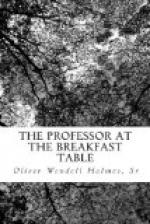The young Marylander brought them all up, you may remember. He recalled to my mind those two splendid pieces of vitality I told you of. Both have been long dead. How often we see these great red-flaring flambeaux of life blown out, as it were, by a puff of wind,—and the little, single-wicked night-lamp of being, which some white-faced and attenuated invalid shades with trembling fingers, flickering on while they go out one after another, until its glimmer is all that is left to us of the generation to which it belonged!
I told you that I was perfectly sure, beforehand, we should find some pleasing girlish or womanly shape to fill the blank at our table and match the dark-haired youth at the upper corner.
There she sits, at the very opposite corner, just as far off as accident could put her from this handsome fellow, by whose side she ought, of course, to be sitting. One of the “positive” blondes, as my friend, you may remember, used to call them. Tawny-haired, amber-eyed, full-throated, skin as white as a blanched almond. Looks dreamy to me, not self-conscious, though a black ribbon round her neck sets it off as a Marie-Antoinette’s diamond-necklace could not do. So in her dress, there is a harmony of tints that looks as if an artist had run his eye over her and given a hint or two like the finishing touch to a picture. I can’t help being struck with her, for she is at once rounded and fine in feature, looks calm, as blondes are apt to, and as if she might run wild, if she were trifled with. It is just as I knew it would be,—and anybody can see that our young Marylander will be dead in love with her in a week.
Then if that little man would only turn out immensely rich and have the good-nature to die and leave them all his money, it would be as nice as a three-volume novel.




